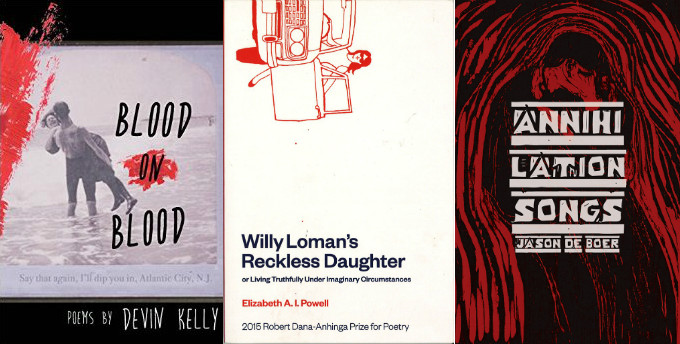
Ubiquity is a hell of a thing. No two people will have the same narratives, pop culture references, or cultural mythologies dwelling in the back of their heads–but there are certain stories that are familiar enough to enough people that they’re ripe for retelling. Or, in some cases, they’re ripe for modification, for translation into another narrative, playing with readers’ expectations and knowledge of the source material. To cite a few examples, John Darnielle’s short novel Master of Reality used a Black Sabbath album to explore questions of depression, mental health, and evolution over time. Nalo Hopkinson’s story “Shift” takes characters and images from The Tempest in a very different direction from Shakespeare’s original play. Tim Kinsella’s Let Go and Go and On told a winding narrative blending the life of actress Laurie Bird with the roles she played in a handful of iconic films. And Michael Swanwick’s novel Jack Faust juxtaposes the story of Faust with an extended, almost hallucinatory, riff on several centuries’ worth of European history.
A trio of recent books demonstrates the range of emotions and stylistic exploration that can emerge when working with an existing text. In the case of Devin Kelly’s poetry collection Blood On Blood, the seed from which it emerges Is Bruce Springsteen’s album Nebraska–itself a work with its own literary antecedents. (i.e. the work of Flannery O’Connor.) Here, Kelly fragments the themes and images of Springsteen’s album and reassembles them, sometimes making literal what Springsteen left as subtext, sometimes stretching out single moments into something more expansive. “we are all living in the novels/ others have created,” Kelly writes in the poem “My Father’s House,” which acts as a statement for both this book and the album from which it draws inspiration.
There are a few metatextual nods in the book: the narrator of the penultimate poem, “While Waiting To See Bruce,” anticipates a Springsteen concert, and hearing “that one/ about the brothers off Nebraska.” Arguably the most breathtaking moments in Blood on Blood come via a series of prose poems interspersed throughout the book, titled “The Story of How You & Your Brother Grew Up, Part [number]” The sixth of these finds a bold way to translate Springsteen’s tales of restless men, open roads, and the liberation and confinement of the Garden State into an onrush of prose and emotion.
Bruce Springsteen offers one window into everyday life and the compromises, lost dreams, and flawed interactions that can come with it. Arthur Miller’s plays offer a different vision on these themes, and Elizabeth A. I. Powell’s Willy Loman’s Reckless Daughter, or Living Truthfully Under Imaginary Circumstances includes abundant work drawing from Miller’s Death of a Salesman, as well of artistic movements that ran in parallel to it. “Living Truthfully Under Imaginary Circumstances” juxtaposes memories of the past and declarations of selfhood with the language of stage directions and allusions to the Meisner technique, utilized by a host of actors since the mid-20th century.
Throughout the book, Powell juxtaposes her own memories with the narrative of Miller’s play. “Traveling Salesman in Providence” situates a Loman-like figure in a hotel room, but the setting is decidedly more contemporary than Miller’s play, given the references to CNN and Viagra. In “Autocorrect the Lyric I,” an essay that opens the book, Powell makes the connection between her own life and Miller’s narrative: “Around then, I read my father’s 1960s Compass copy of Arthur Miller’s ‘Death of a Salesman’ and began to understand why his sister called him Willy Loman.” In this book, Powell demonstrates the power of literature to offer insights into our own lives, even as those insights may not be all that welcome.
The three narratives told in Jason DeBoer’s Annihilation Songs are adapted from older sources: in an introduction, he describes his process of “disintegrating and then reintegrating Shakespeare’s plays.” Here, the plays being reimagined are Hamlet, The Tempest, and The Two Gentlemen of Verona. And the effect is one of collapse: archaic language abuts more contemporary themes, and the density of each of these narratives creates a dizzying effect. This is to say nothing of the use of familiar character names: when, in “Here Swims a Most Majestic Vision,” the reader first encounters Caliban drinking himself into oblivion on a coach, the blend of recognition and disorientation is heady indeed.
DeBoer outlines a thoroughly flawed, often violent dynamic between Caliban and Miranda. “At times she was insolent enough to roar at his waste, but in the end he had her bawling,” he writes. “Then he would leave to drink with the rabble, the dregs of his friends, to whistle at women and worse.” That linguistic juxtaposition reaches its apex early on, in the Hamlet-derived “Puzzles of War,” set against the backdrop of the Second World War. In it, we encounter sentences like “The German army fell back, but their cannons still cleft the moon.” Fall into this book’s rhythms and the blend of old and new becomes captivating, a literary equivalent of what filmmakers like Julie Taymor and Michael Almereyda have done to take Shakespeare’s work in new directions.
Kelly, Powell, and DeBoer are working in very different styles in their respective books, with differing degrees of fidelity to their source material. Kelly’s book reads as homage and deconstruction both, while Powell’s feels like an exploration of certain aspects of emotional and familial trauma through a literary lens. DeBoer’s relationship to the books at the heart of his book comes off as the most combative: one part Oulipian constraint, one part literary wrestling match. The results for each, though, make for fascinating reading, regardless of your feelings on (or past experience with) the works from which they’ve emerged.
Follow Vol. 1 Brooklyn on Twitter, Facebook, and sign up for our mailing list.
